- europages
- >
- COMPANIES - SUPPLIERS - SERVICE PROVIDERS
- >
- crushing machinery
Results for
Crushing machinery - Import export
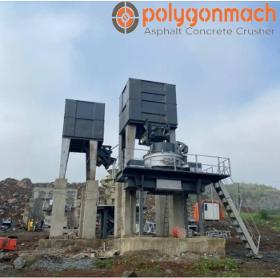
POLYGONMACH MAKINE SANAYI VE TICARET LTD STI
Turkey
A 700 1000 TPH Limestone Crushing and Screening Plant is a facility designed to process limestone raw material into high-quality aggregates with a throughput capacity of 700 to 1000tons per hour. These plants are specifically designed to cater to the demands of different industries like construction, road building, and landscaping, where such high-quality limestone aggregates are required. It usually hosts primary crushing equipment, screening machinery, and conveyors—all designed to handle limestone material conveniently. The initial processing of larger limestone rocks into smaller, more workable fragments is done with primary crushers like jaw crushers and cone crushers. This is very important for the sizing of the raw limestone material, required for further processing, into a size that is ready for making the final product, as per the defined size and quality requirements.
Request for a quote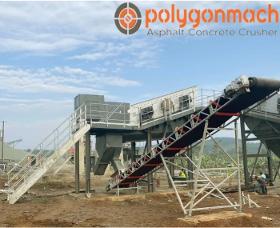
POLYGONMACH MAKINE SANAYI VE TICARET LTD STI
Turkey
350-500 tph Riverstone Crushing and Screening Plants are specialized facilities designed to process Riverstones into high-quality stone aggregates within a throughput capacity range of 350 to 500 tons per hour. These plants consist of essential components such as primary crushing equipment, screening machinery, and conveyors tailored to efficiently handle Riverstone materials. The primary crushing stage involves crushers like jaw crushers, cone crushers, or impact crushers that break down large Riverstones into smaller fragments, preparing them for subsequent processing within the specified throughput capacity. Following primary crushing, the material is directed to screening equipment, such as vibrating screens, which classify the Riverstone aggregates into different fractions based on size requirements. This careful screening process ensures that the final aggregates meet stringent quality standards essential for various construction, landscaping, and industrial applications.
Request for a quote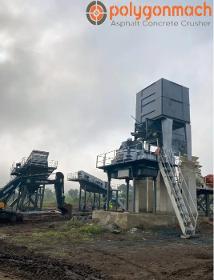
POLYGONMACH MAKINE SANAYI VE TICARET LTD STI
Turkey
250-350 tph Riverstone Crushing and Screening Plants are specialized facilities designed to process Riverstones into high-quality stone aggregates within a throughput capacity range of 250 to 350 tons per hour. These plants consist of essential components such as primary crushing equipment, screening machinery, and conveyors tailored to handle Riverstone materials efficiently. The primary crushing stage involves crushers like jaw crushers, cone crushers, or impact crushers that break down large Riverstones into smaller fragments, preparing them for subsequent processing within the specified throughput capacity. Following primary crushing, the material is directed to screening equipment, such as vibrating screens, which classify the Riverstone aggregates into different fractions based on size requirements. This meticulous screening process ensures that the final aggregates meet stringent quality standards necessary for various construction, landscaping, and industrial applications.
Request for a quote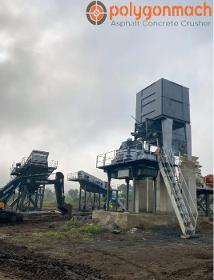
POLYGONMACH MAKINE SANAYI VE TICARET LTD STI
Turkey
150-250 tph Riverstone Crushing and Screening Plants are specialized facilities designed to process Riverstones into high-quality stone aggregates within a throughput capacity range of 150 to 250 tons per hour. These plants consist of essential components such as primary crushing equipment, screening machinery, and conveyors tailored to handle Riverstone materials efficiently. The primary crushing stage involves crushers like jaw crushers, cone crushers, or impact crushers that break down large Riverstones into smaller fragments, preparing them for subsequent processing within the specified throughput capacity. Following primary crushing, the material is directed to screening equipment, such as vibrating screens, which classify the Riverstone aggregates into different fractions based on size requirements. This meticulous screening process ensures that the final aggregates meet stringent quality standards necessary for various construction, landscaping, and industrial applications.
Request for a quote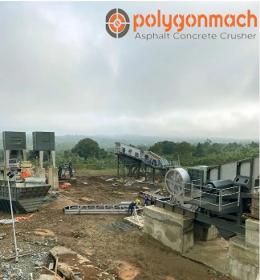
POLYGONMACH MAKINE SANAYI VE TICARET LTD STI
Turkey
A 40-60 TPH Limestone Crushing and Screening Plant is a facility designed to process limestone raw material into high-quality aggregates with a throughput capacity of 40 to 60 tons per hour. These plants are specifically designed to cater to the demands of different industries like construction, road building, and landscaping, where such high-quality limestone aggregates are required. It usually hosts primary crushing equipment, screening machinery, and conveyors—all designed to handle limestone material conveniently. The initial processing of larger limestone rocks into smaller, more workable fragments is done with primary crushers like jaw crushers and cone crushers. This is very important for the sizing of the raw limestone material, required for further processing, into a size that is ready for making the final product, as per the defined size and quality requirements.
Request for a quote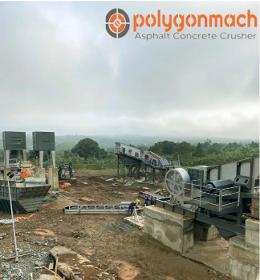
POLYGONMACH MAKINE SANAYI VE TICARET LTD STI
Turkey
700-1000 tph Riverstone Crushing and Screening Plants are sophisticated facilities designed to process large quantities of Riverstones into high-quality aggregates at an impressive throughput capacity ranging from 700 to 1000 tons per hour. These plants consist of specialized primary crushing equipment, advanced screening machinery, and efficient conveyors tailored to handle substantial volumes of Riverstones. The primary crushers, such as jaw crushers and impact crushers, play a pivotal role in breaking down the raw Riverstones into smaller fragments at the initial stage of the processing cycle. This primary crushing phase is essential for preparing the raw material for subsequent processing stages by effectively reducing the size of the Riverstones within the specified high throughput capacity range.
Request for a quote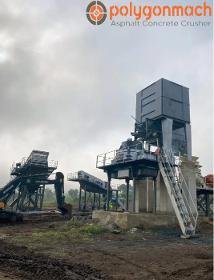
POLYGONMACH MAKINE SANAYI VE TICARET LTD STI
Turkey
350-500 tph Riverstone Crushing and Screening Plants are advanced facilities designed to efficiently process Riverstones into high-quality aggregates at a throughput capacity ranging from 350 to 500 tons per hour. These plants consist of specialized primary crushing equipment, screening machinery, and conveyors tailored for the effective processing of Riverstones into various sizes of aggregates suitable for a wide range of construction, landscaping, and industrial applications. The primary crushers, such as jaw crushers or impact crushers, play a crucial role in breaking down the raw Riverstones into smaller fragments at the beginning of the processing cycle. This primary crushing stage is essential for preparing the raw material for subsequent processing stages by effectively reducing the size of the Riverstones within the specified throughput capacity.
Request for a quote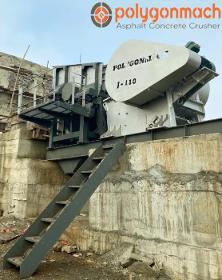
POLYGONMACH MAKINE SANAYI VE TICARET LTD STI
Turkey
The 50-100 tph Riverstone Crushing and Screening Plants shall produce high quality aggregates out of Riverstones at an efficiency in a throughput capacity range of 50 to 100 tons per hour. Prescreening, primary crushing, screening machineries, and conveyors need to be set up for the processing of Riverstones especially for setting up the main infrastructure with suitable size fractions for construction, landscaping, and industrial purposes. The primary crushers at such plants include jaw or impact crushers, which take the raw Riverstones and break them into smaller fragments to kick off the processing. The process of screening separates these aggregates in sizes according to any given project's specifications. The break sizes are specified in applications; the size is directly proportionate to the life of the road. The vigorous screening process guarantees the final aggregates within very tight quality standards for varied applications and makes
Request for a quote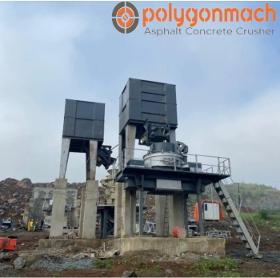
POLYGONMACH MAKINE SANAYI VE TICARET LTD STI
Turkey
A 700-1000 TPH Gabbro Crushing Screening Plant is an industrialized facility created for handling huge amounts of gabbro rock and processing it into various aggregate sizes needed for various construction and industrial purposes. Such plants, with their capability for processing between 700 and 1,000 tons of gabbro per hour, are crucial in running large-scale operations where efficiency and high output are important. They have heavy machinery that will crush the rough, coarse-grained gabbro rock into medium manageable and then sort it out according to sizes. That will make them perfect for use in those projects that demand large volumes of highest-quality aggregate, which includes highway construction, airport runways, and large infrastructure projects. The plants are not all about brawn; they are technological masterpieces put into place to ensure there is accuracy in the crushing and screening departments.
Request for a quote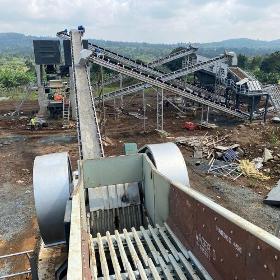
POLYGONMACH MAKINE SANAYI VE TICARET LTD STI
Turkey
These plants long lifespan makes them ideal for large-scale mining quarrying and recycling operations where the volume and consistency of the material being processed necessitate a dependable long-term solution with high productivity. Portable crushing plants can be built with specific operational requirements in mind taking into account factors like the type of material to be processed capacity requirements end-product specifications and spatial constraints unique to the site. The plant will be able to manage the expected throughput and material properties with this level of personalization providing a tailored solution that maximizes the profitability and productivity of the operations. Modern technology features like automation and monitoring systems which provide operators with precise control over the crushing process are integrated into operations to further improve their efficiency safety and scalability.
Request for a quote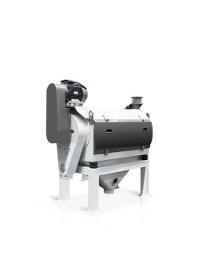
ROBINSON CO.
Turkey
It is designed for separating flour particles stuck on bran and remaining in bran in flour and semolina factories. The flour and ash particles in the bran are separated and brought into the system and the efficiency is increased and efficiency is provided.
Request for a quote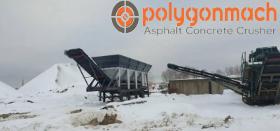
POLYGONMACH MAKINE SANAYI VE TICARET LTD STI
Turkey
What is a Mobile Aggregate Sand Gravel Dosing Bunker? The Aggregate Sand Gravel Dosing Bunker is a movable device used for storing, dosing, and transporting aggregates such as sand and gravel. This mobile facility is specifically very useful in those industries where flexibility and efficiency of material handling play a vital role, like construction, mining, and infrastructure projects. It is portable, thus easily transferrable from one site to another, making it the solution of choice in projects that need on-the-go material supply with dosing capability. This bunker system is designed to provide a convenient, on-site aggregate management facility with the minimum of fuss and maximum reliability. Be it for roadworks, concrete plants, or any process requiring the exact and repeatable dosing of materials, this machinery truly provides outstanding versatility to keep any operation running smoothly.
Request for a quote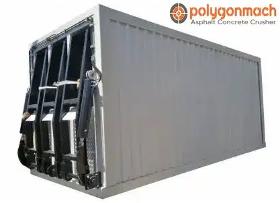
POLYGONMACH MAKINE SANAYI VE TICARET LTD STI
Turkey
What Is a Bitumen Drum Barrel Heater Decanter? In road construction, the Polygonmach Bitumen Barrel Heater Decanter is one of the important machines in the field, and hence, it is so important in the construction industry. The main work is heating and liquefaction of bitumen. Bitumen usually comes in solid or semi-solid state in standard barrels. The process makes the bitumen ready to use in various activities involving construction, mostly in building and road maintenance. This machine ensures that bitumen is in the right state for application; hence, one is assured that the expected execution and projected long-term quality and durability of a road construction job are met. The use of these heaters/decanters is hence widespread owing to how effectively they change bitumen from the stored state into the state that it can be used as a liquid.
Request for a quote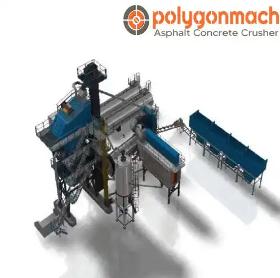
POLYGONMACH MAKINE SANAYI VE TICARET LTD STI
Turkey
Asphalt Manufacturing Facility The stationary hot mix asphalt plants from Polygonmach are not transportable instead they are fixed in one place and intended for large-scale asphalt production. With capacities ranging from 60 to 400 tonnes per hour these plants can produce asphalt continuously which makes them perfect for large-scale projects. Their main job is to combine aggregates like crushed stone sand or gravel with a binder called asphalt cement to create high-quality hot mix asphalt which is an essential material for road construction and maintenance. Asphalt Plant Near me A vital part of any asphalt plant is aggregate storage. The plant stores aggregates in sizable bins or stockpiles which include sand gravel and crushed stone. These components which make up the majority of the asphalt mix are first sorted according to size and quality before being added to the mixing process.
Request for a quote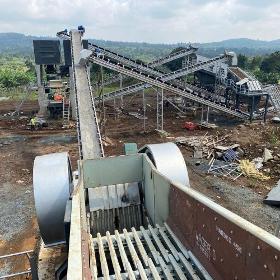
POLYGONMACH MAKINE SANAYI VE TICARET LTD STI
Turkey
700-1000 TPH Basalt Crushing and Screening Plant is made for basalt aggregate producing at high production through output. Basalt Crushing and Screening Plants can be used for many different purposes in a wide range of sizes, according to the third stage of the modern performance-made machine and machinery. These plants have a reinforcement of strong basalts that are characteristic of very great volcanic stones of high durability. These plants basically break large boulders of basalt rocks into smaller chips and thereafter screen them to generate high-quality aggregate, suitable for a large variety of applications in construction, infrastructure development, and industrial projects. These plants, by processing basalt rocks, play an important role in delivering strong materials needed for construction projects where durable and reliable aggregates are required to support heavy loads and environmental conditions.
Request for a quote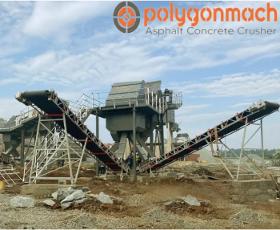
POLYGONMACH MAKINE SANAYI VE TICARET LTD STI
Turkey
The 500-750 TPH Basalt Crushing Screening Plant is an industrial installation designed for processing big rocks made of basalt into varied dimensions of basalt aggregates within a range of 500/750 tonnes each hour. Basalt is a pretty dense volcanic rock, durable, and strong, which is why it is at the top of the list of items used in construction works that require strenuous and long-lived materials. These plants are highly equipped with superior machinery and equipment required to effectively and more efficiently process huge loads of basalt, which is reduced to smaller sizes that mainly make up the need for various construction and industrial applications. The processed basalt aggregates are applied to a wide range of projects, including those for road construction, infrastructure development, and the production of concrete and asphalt products.
Request for a quote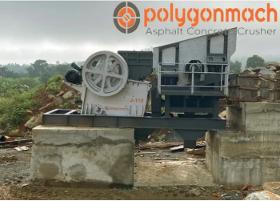
POLYGONMACH MAKINE SANAYI VE TICARET LTD STI
Turkey
350-500 tph basalt crushing and screening plants have been introduced in special place, thanks to its ability to process the basalt and produce the required aggregate for making various kinds of construction work and meets an operating capacity of 350-500 tons per hour. It is associated with machinery and equipment that are in operation for basalt, one of the toughest durable volcanic stones. These plants are mainly designed to crush large basalt stones into smaller fragments and then screen them in a way to prepare good quality aggregates that are extremely versatile and suitable for a wide range of construction, infrastructure, and industrial projects. By helping to produce robust materials efficiently for the crushing of basalt, these plants correspond to construction projects requiring strong, dependable aggregates to survive heavy loads and harsh environmental conditions.
Request for a quoteDo you sell or make similar products?
Sign up to europages and have your products listed
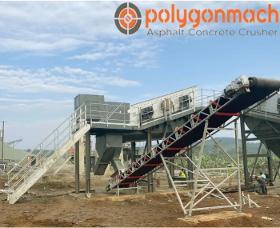
POLYGONMACH MAKINE SANAYI VE TICARET LTD STI
Turkey
A 150-250 tph Basalt Crushing and Screening Plant is a progressive facility that processes 150-250 tons of basalt stone at input sizes of 600 mm, into end products of 0-5mm, 5-12 mm, 12-24 mm. These are appropriate for road constructions as well as commercial purposes. These plants are generally designed to crush large basalt rocks into smaller fragments and screen them to produce high-quality aggregates suitable for applications in construction, infrastructure development, and industrial projects. Manufacturing robust materials by means of efficient basalt processing, these plants are important contributors to the various construction endeavors that must be carried with the utmost certainty in mind.
Request for a quote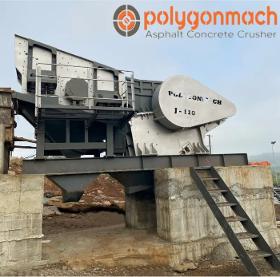
POLYGONMACH MAKINE SANAYI VE TICARET LTD STI
Turkey
100-150 tph Basalt Crushing and Screening Plants are specialized facilities designed for processing basalt stones into various sizes of aggregates at a throughput capacity ranging from 100 to 150 tons per hour. These plants are equipped with machinery and equipment tailored for handling basalt, a durable volcanic stone known for its strength and versatility. The primary function of these plants is to crush large basalt stones into smaller fragments and then screen them to produce high-quality aggregates suitable for applications in construction, infrastructure development, and industrial projects. By efficiently processing basalt, these plants play a vital role in producing robust materials essential for various construction endeavors requiring resilient and reliable aggregates.
Request for a quote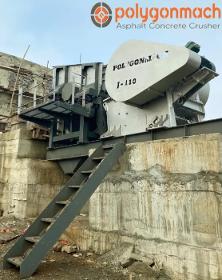
POLYGONMACH MAKINE SANAYI VE TICARET LTD STI
Turkey
The 50–100 tph basalt crushing and screening plan is a plant that embodies facilities to screen and process basalt stones into a form with different stone sizes containing a capacity range from 50 to 100 tons per hour. These are plants designed scrupulously for taking extra care in handling the volcanic stone, basalt, which is known for its strength and durability. These plants primarily crush big stones of basalt into smaller pieces, after which they screen the materials that have come up with different sizes applicable in building, infrastructure, and industrial use. In essence, these plants produce high-quality aggregate that is used in projects that require materials to be equally strong and formidable.
Request for a quote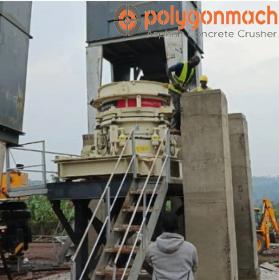
POLYGONMACH MAKINE SANAYI VE TICARET LTD STI
Turkey
A 40-60 TPH Basalt Crushing Screening Plant represents the optimal configuration in regard to crushing and curing basalt stones for a proper production facility. Basalt, the volcanic rock, with phenomenal indicators for stress, is filled with the unknown minerals, having extremely unique properties, hardness, and durability, making it easy to produce. These plants intake large stones of basalts, crush them into smaller fragments using a primary crusher, and then secondary crushers take over to refine the material in order to obtain aggregate fractions of certain sizes. The vibration screens classify the crushed basalts into different size fractions. This systematic approach guarantees that projects in construction, infrastructure, and landscaping that require top-quality basalt aggregates meet the final quality and usability required.
Request for a quote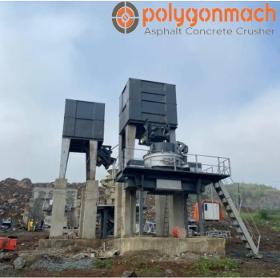
POLYGONMACH MAKINE SANAYI VE TICARET LTD STI
Turkey
A basalt crushing and screening plant is a facility that meets the purposes of crushing and screening of basalt stones into aggregate sizes demanded on construction fields, infrastructure, and industry. Basalt is an igneous rock with basaltic features. Large pieces of basalt are broken into smaller ones in the process of crushing, made with such equipment as jaw crushers or cone crushers. After the primary crushing stage, it is separated by sifting in order to segregate the particular material according to size, enabling the production of different sizes of the same material. The efficiency of separation for these highly intermixed crushed basalt materials, in different fractions by size, by the vibrating screens makes them an integrative screen in the process. It is t he enormous product that comes out from basalt\toc crushing and screening plants. It can be used as high-quality aggregate for making concrete, building highways, making gardens, and other constructions that need firm an
Request for a quote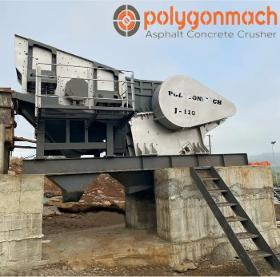
POLYGONMACH MAKINE SANAYI VE TICARET LTD STI
Turkey
500-750 tph Riverstone Crushing and Screening Plants are advanced facilities designed to process Riverstones into premium stone aggregates within a throughput capacity range of 500 to 750 tons per hour. These sophisticated plants consist of primary crushing equipment, screening machinery, and conveyors specifically configured to handle Riverstone materials efficiently. The primary crushing stage involves robust crushers such as jaw crushers, cone crushers, or impact crushers that break down large Riverstones into smaller fragments, preparing them for subsequent processing within the specified high throughput capacity. Following primary crushing, the material is meticulously screened using vibrating screens to classify the Riverstone aggregates into different fractions based on size requirements. This precise screening process guarantees that the final aggregates meet strict quality standards necessary for various construction, landscaping, and industrial applications.
Request for a quote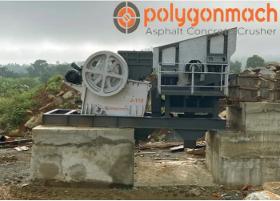
POLYGONMACH MAKINE SANAYI VE TICARET LTD STI
Turkey
100-150 tph Riverstone Crushing and Screening Plants are special plants that are intended for processing Riverstones into aggregate in-crushed-stone-quality needs within a throughput capacity range of 100 to 150 tons per hour. The plants would have primary crushing equipment, screening tools, conveyors—all critical units designed specifically to handle Riverstone material efficiently. Primary crushing includes crushers like jaw crushers or cone crushers that break the larger size of Riverstones into smaller pieces in preparation for the subsequent processing stages, specified in the throughput capacity. The screened material through primary crushing goes to screening equipment, such as vibrating screens, whose task is to classify the Riverstone aggregates by size into fractions. All this is an outcome of rigorous screening processes that lead to the making of aggregates in strict adherence to quality standards, which are put to use in countless construction, landscaping, and industrial
Request for a quote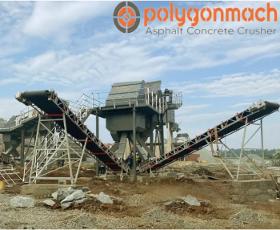
POLYGONMACH MAKINE SANAYI VE TICARET LTD STI
Turkey
The capacity range to process Riverstones in designing 50-100 tph Riverstone Crushing and Screening Plants is up to high-quality aggregates, sometimes between 50 and 100 tons per hour. This plant works by first feeding raw Riverstones into primary smashing equipment, such as jaw smashers or impact smashers, which do play a very important role in the smashing of the bigger stones of Riverstones into smaller fragments of stone at the start of processing. The primary crushing stage is a very important part of the process for producing raw material to be fed into the later stages of the process, with a specified range of throughput capacity, to ensure that the river stones are well processed into the premium stone aggregates required for construction, landscaping, and industrial applications. Screening is then done as the next stage following primary crushing; this may be done mainly using vibrating screens, thus classifying the riverstone aggregates into the required fractions based on si
Request for a quote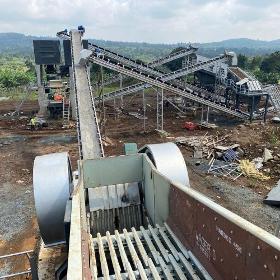
POLYGONMACH MAKINE SANAYI VE TICARET LTD STI
Turkey
Limestone is effectively a sedimentary rock primarily consisting of calcium carbonate, typically in the form of the mineral calcite. Over vast ages, this rock builds up from depositional formation of marine creatures such as shellfish, coral, and algae that accumulate, sowing up as solid rock. Much of the time, these rocks contain fossils. Moreover, visible formation in terms of layers further bears record to its formation from the ocean's bed. Limestone has been used in construction since time immemorial owing to its high content of calcium. It is greatly durable, relatively easy to cut and carve, and provides an aesthetically pleasing material fit for building purposes of every type, from monuments to pavement stones. Adapted in highly ornate designs and sculptures, it is smooth in texture and beautiful in its coloration, thus giving a soft but timeless material for the architect or the builder.
Request for a quote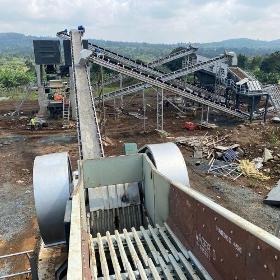
POLYGONMACH MAKINE SANAYI VE TICARET LTD STI
Turkey
The 700-1000 TPH dolomite crushing screening plant shall be a high-capacity industrial plant built to crush dolomite ore, which can produce all the required aggregates for construction projects. The term "TPH" means how many tonnes of dolomite ore the plant can get through in an hour, which is between 700 to 1000 tonnes per hour. This capability makes it be a core element in vast construction projects that require dolomite aggregates continuously. Dolomite, being of the composition calcium magnesium carbonate, is an essential material for construction, more so in the manufacture of concrete aggregates, road base materials, and other important building resources. These plants thus ensure that dolomite is well processed and sorted out to suit the specifications of construction applications.
Request for a quote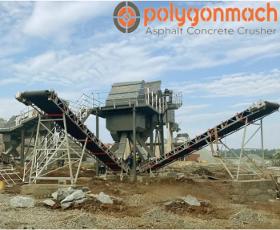
POLYGONMACH MAKINE SANAYI VE TICARET LTD STI
Turkey
A 500-750 TPH Dolomite Crushing Screening Plant is a technology-driven large processing facility meant to provide high-throughput dolomite ore processing into different sizes of aggregates against use in the construction field. The abbreviation "TPH" stands for "tonnes per hour," and it means a plant of this kind can process from 500 to 750 tonnes of dolomite ore every hour. Dolomite plays a key role as a material in the construction industry, mostly produced into concrete aggregates and road base materials, among others of importance. These plants are important for the crushing and screening of dolomite ore into various sizes that would be needed for any specified construction project by providing a steady supply of high-quality aggregates, which are essential in a broad range of applications in the entire construction industry.
Request for a quote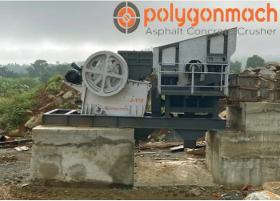
POLYGONMACH MAKINE SANAYI VE TICARET LTD STI
Turkey
350-500350-500 tph Dolomite Crushing Screening Plants are modern industrial plants designed to process dolomite ore in order to produce a great variety of dolomite aggregates that are demanded by different construction projects. The abbreviation "tph" itself means the capacity of the plant dealing with the amount of material per hour; therefore, this plant processes 350 to 500 tons of dolomite ore in an hour. Dolomite, the calcium magnesium carbonate mineral, is very essential in the construction industry in making concrete aggregates and road base materials, among other important construction materials. These high-capacity plants play an important role in the crushing and screening of dolomite ore efficiently into specified requirements for construction projects, thereby ensuring a constant supply of superior quality dolomite aggregates for construction applications.
Request for a quoteResults for
Crushing machinery - Import exportNumber of results
211 ProductsCompany type